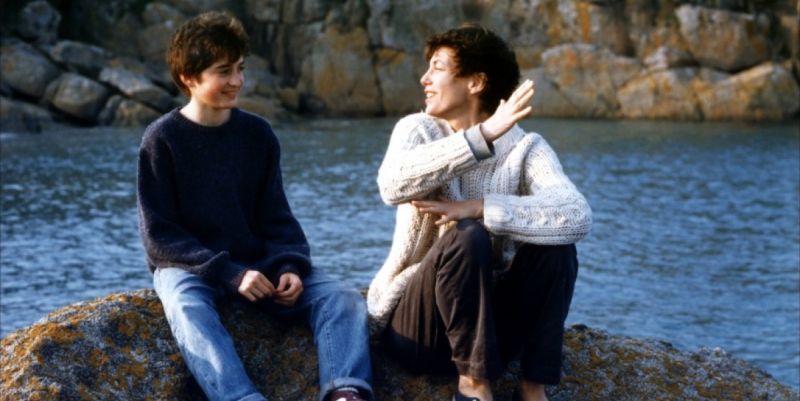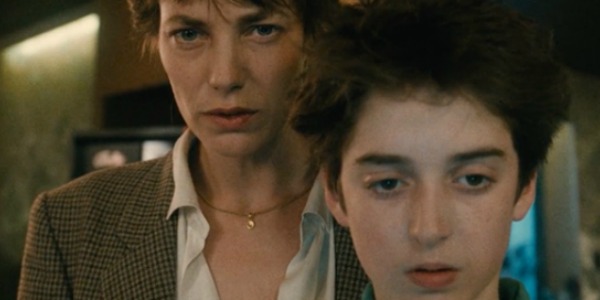KUNG-FU MASTER!: Agnès Varda’s Family Values

I got started watching avant-garde film at Oklahoma State University…
Entering the world of an Agnès Varda film requires coming to terms with who she is as a filmmaker. She understood and explored the ways in which documentary and fiction are inextricably linked while generally eschewing linear narratives, working instead to show her own complex relationship with her films as she made them.
Films like Jane B. Par Agnès V., The Gleaners and I, and The Beaches of Agnès Varda all include the name of the filmmaker in their title, acknowledging her role as both creator and subject of her numerous film projects. In these films and others we see Varda on screen or hear her speaking, but this is not the case with Kung-Fu Master! (Le petit amour). Instead the film unfolds with a mostly conventional, causal narrative with a voice-over by the main character.
Family Love
Shot alongside Jane B. Par Agnes V. in 1988, the relatively conventional, linear narrative of Kung-Fu Master! is coupled with a challenging story that, on its surface, involves an older woman falling in love with a young boy and moving away with him to a desert island.
But the romance between a newly-turned 40 year old Mary-Jane (Jane Birkin) and 14 year old Julien (Mathiew Demy) needs to be understood within the context of Varda‘s interest in time: childhood, aging, turning 40. This is less a film about a woman’s sexual appetite for young boys than it is about what it means to be a 40 year old single mother or to be a 14 year old boy.

It helps to understand the relationships between Varda and the actors playing these roles: Mathiew Demy (Julien) is Varda’s and fellow French New Wave phenom Jacques Demy’s own son. Jane Birkin plays Mary-Jane, the mother of Lucy (Charolette Gainsbourg) and Lou (Lou Doillin); both are Jane Birkin‘s real daughters.
These familial relationships provide more complexity and meaning to the movie as it centers on a divorced mother with two daughters. With Jane Birkin playing mother to her own daughters, the performance of the role of Mary-Jane becomes less distinguishable from a depiction of herself in real life. And Mathiew Demy acting in a movie for his mother means this film works like a kind of home movie for Varda for her to capture her son at that young age.
Love of the Game
Because this story appears, on the surface, as a fairly simple one, it is important to note the ways in which this narrative is not linear or conventional. Right from the start, after the title credits, the sound effects from an 80’s arcade video game begin playing as we see a young boy (Julien) dressed in a karate outfit, with the camera sped up just enough to render his motion unnatural.
The French title of the film, Le petit amour, is markedly different from it’s U.S. titled, Kung-Fu Master!. The title refers to the name of Julien’s favorite side-scroll arcade style game video game. This first tracking shot mimics the aesthetics of the video game, but the action represented bears no reality to the world of the film in a strict sense. Rather, Varda is providing the video game as the central metaphor for the film.

As their romance develops, Mary-Jane marvels at Julien’s prowess at the video game. We watch as Julien explains how to level up and advance, ultimately to move your way up five floors of stairs to save Sylvia, the damsel in distress. Sylvia becomes a stand-in for Mary-Jane, as the opening shot already announced Julien’s association with the Kung-Fu hero of the game. Leveling up, which is acquired through “skill” and “passion,” we are told, replaces age or life experience within the metaphor that the film provides.
And this is basically all we, or Mary-Jane, really know about Julien: that he likes to play “Kung-Fu Master!.” Varda gives us characters with little or no history, leaving us to infer their psychological motivations.
After their ill-fated romance has been broken up by responsible adults, Julien finally rescues Sylvia from the game and ineptly tries to deliver the message to Mary-Jane to no avail.
Julien, Youth, and Mothers
Julien is young, but he talks and acts much older than he appears. Around his friends, Julien jokes casually about sex as if he’s a pro. Outside of the opening shot, we first see Julien getting drunk at a party thrown by Lucy in Mary-Jane’s yard. The boys at the party rifle through a magazine for sample condoms, taking them out and playing with them as they joke. Julien brags he is the only one who knows what to do with one.

As Julien leaves the table where the group is settled, he walks past a boy who begins to taunt him that he will get AIDS. Several times in the film, AIDS is mentioned and breaks into the story, providing a historical time that frames the sexual politics at play. Television ads and street posters teach even the youngest daughter, Lou, about the dangerous spread of AIDS.
When Julien is with Mary-Jane, he can wear his pyjamas, and that makes him seem happy, though it’s never completely clear how he feels, at least not the way it’s clear for Mary-Jane, the voice-over narrator. Back at school and seemingly over his fling with Mary-Jane, Julien says that she was “just another housewife.” It’s not entirely clear whether Julien is more mature than he looks or if he is performing for his friends and Mary-Jane.
But it is clear that Mary-Jane views Julien as a boy. There is constant slippage between motherly and erotic love. At one point, Mary-Jane muses, “Do all women fall in love with a boy, or just those without sons?”.
Charolette Gainsbourg as Lucy plays an important role in the film. As her mother falls for Julien, Lucy is strung along in what otherwise looks like family fun, as if Julien and Lucy were brother and sister. Ultimately, despite her affectionate bond with her mother, Julien comes between the two and Mary-Jane decides, on the advice of her mother, to run away with Julien to a remote island.
Conclusion
Intertextuality is a distinguishing characteristic of Varda as well as other French New Wave filmmakers. A prime example of this occurs in Godard’s Tout va bien, where Godard used “Hanoi” Jane Fonda and to imbibe his film with another layer of political content. Or perhaps most famously, Godard‘s Breathless and its references to Humphry Bogart within the film to express the gangster-like characteristics and fantasies of Michel Poiccard (Jean-Paul Belmondo).
We see the importance of intertexual meaning in the film Kung-Fu Master!. Considering its side-by-side production with Jane B. and the overlapping cast, some of the themes of Jane B., such as the star persona of Birkin and her celebrity relationship with Serge Gainsbourg, these help shed light on what Varda is doing by casting Jane Birkin and her real life children. Not only is Varda referencing her own films but also Birkin‘s and, to a lesser degree, other texts like her relationship with Jacques Demy.
Jane Birkin‘s star persona may have faded some by now, but her performance in Kung-Fu Master! has not. And it was refreshing to see the young and talented Charolette Gainsbourg, before her run-ins with Lars Von Trier. Perhaps, where it was interest in Birkin that lent meaning in the 1980s and 90s, now it is Charolette Gainsbourg, whose subsequent career seems to have been born here to some degree.
What did you think? Were Jane Birkin and Charolette Gainsbourg’s performances as good as I think they were?
Kung-Fu Masters! and Jane B. par Agnès V. have both been restored by Cinelicious and will be re-released on VOD through Amazon on the 2nd of February 2016. They get a BluRay release on March 8, 2016, and VOD release on all other major platforms.
https://www.youtube.com/watch?v=sXhcAXq_SpU
Does content like this matter to you?
Become a Member and support film journalism. Unlock access to all of Film Inquiry`s great articles. Join a community of like-minded readers who are passionate about cinema - get access to our private members Network, give back to independent filmmakers, and more.
I got started watching avant-garde film at Oklahoma State University at an event called Exciterbulb. Through this I have been fortunate to view a decent number of rare avant-garde films, and accounting for these technological miracles is my main intellectual curiosity in life. I view and review movies of all sorts, and in general I never shy away from a pointless debate.













